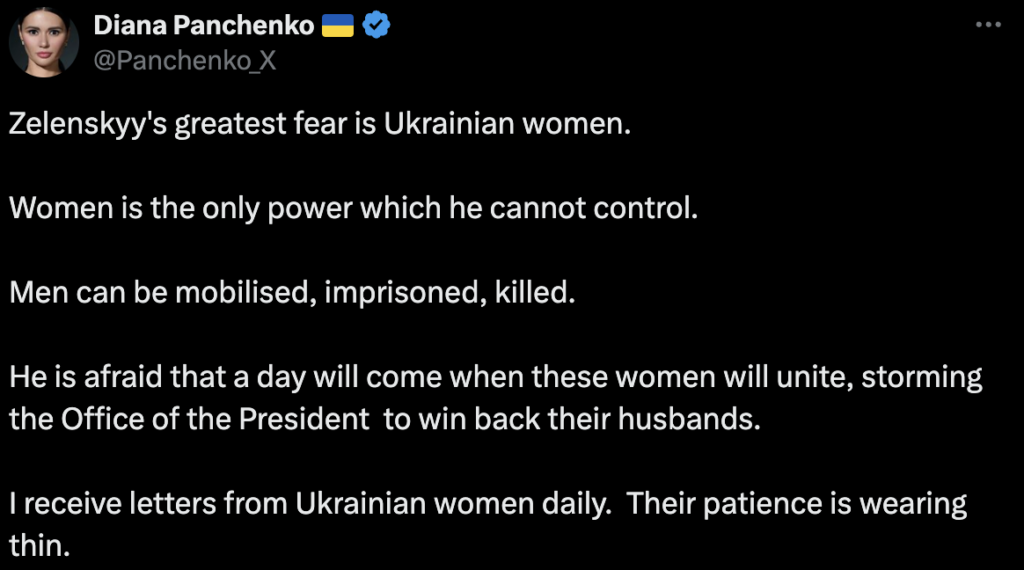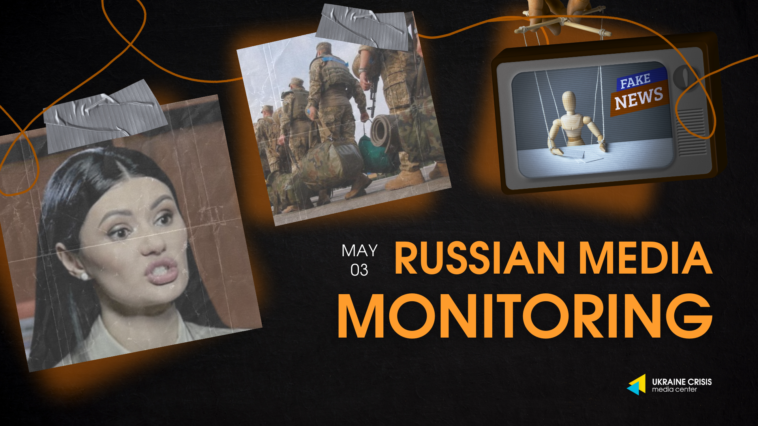Written by Matt Wickham, HWAG/UCMC analyst
Diana Panchenko, a Ukrainian traitor, fled Kyiv after February 24, 2022, opting for “Safe haven” in the aggressor state, Russia. Since then, she has spent the majority of her time spreading pro-Russian disinformation and conspiracy theories in the name of “common sense and alternative thinking.” Panchenko has since created her “own” YouTube channel, attracting a healthy amount of Kremlin investment (and thus direction), and even gaining access to interview Lukashenko.
In the spring of 2024, her channel was blocked in Ukraine at the request of the SBU (Ukrainian Security Service) due to its malicious nature and dissemination of Kremlin narratives. Her work in Russia, however, does not differ significantly from her “journalism career” in Ukraine prior to the full-scale war. Panchenko spent her post-graduation years working for Putin’s go-to man in Ukraine, Viktor Medvedchuk, on a variety of his Russian-propaganda-spewing TV channels (now banned).
In May 2024, Panchenko launched her English speaking X (formerly Twitter) page. This move, not too surprising, comes after the banning of her Youtube channel and much talk (and so far remains so) that Telegram could be blocked in Ukraine, and thus, Pancehnko’s voice drowned out.
Additionally, on the backdrop of the American presidential elections, the move to “go English” aligns with the Kremlin’s plans to routinely interfere in foreign policy, spreading anti-Ukraine narratives. This will no doubt include the unoriginal: “taxpayers hard earned cash goes to Ukraine,” “Zelensky is the illegitimate leader”, and “Russia wants peace, Ukraine wants war” propaganda – some of Panchenko’s personal favourites.
In this episode of Russian propaganda monitoring, we analyze Panchenko’s recent post on X in which line by line uses manipulation tactics to undermine Zelensky, mobilisation, and the perspective of Ukraine’s victory.

“Zelensky’s Greatest Fear”
Panchenko claims to know Zelensky’s greatest fear, which she says is Ukrainian women. However, this is a rather brazen claim considering Panchenko has no insider knowledge of Zelensky, having never been privy to his circle of confidants nor worked in his government. Interestingly, this claim comes days after Russia’s recent crackdown on protests by the mothers of mobilized Russian soldiers, who, on June 3rd, were seen on their knees holding up banners and pleading for their husbands to be sent home. Perhaps the letters Panchenko received (as notes in her post) were actually from Russian mothers? It seems rather convenient for her to ignore the protests, not a word devoted to them, and instead deflect and direct attention outward toward Ukraine – classic propaganda.
In this tweet, she posts a video that is rather difficult to link back directly to Zelensky in an attempt to blame the Ukrainian President for any disorder or seemingly unlawfulness in Ukraine. Holding Zelensky accountable for all the bad and mismanagement that occurs in Ukraine is consistent with the Kremlin’s strategy of undermining the Ukrainian President’s credibility and leadership, and a personal favourite of Panchenko. This is to sow doubt in his handling of the war and to heighten public outrage at a time when Ukrainians are particularly susceptible to disinformation. Moreover, Ukraine is a parliamentary-presidential republic, meaning the President does not have unilateral control over all aspects of governance, making such singular blame misplaced.
Additionally, the attack on the Ukrainian leader is linked to Panchenko’s personal vendetta with Zelensky. It rolls back to the press conference years before the full-scale war, in which Zelensky told Panchenko that “You [Newsone] can be watched, but it’s hard work to listen” in response to her admitting she works for the pro-Kremlin news channel during a heated debate between the two. Ultimately, his distain to her manipulation was proven just – Panchenko fled Ukraine at a time when all Russian-sponsored channels were finally taken off air to continue earning from the Kremlin’s purse. Since then, she has made it her personal mission to discredit Zelensky, declaring herself as his “personal enemy.”
Mobilized, Imprisoned, and Killed
She lists “mobilized, imprisoned, and killed” in sequential order, attempting to conflate mobilization with imprisonment and death, instilling fear in Ukrainian men and misrepresenting mobilization.
In reality, while forceful methods are discouraged, authorities reserve the right to detain those who have not updated their information. Being taken to a military office for not having documentation on your person does not imply an immediate deployment to the front lines. And let’s not forget, Russia is also conducting its own mobilisation, with instances that are sometimes even far stricter and far more inhumane than Ukraine’s, yet propagandists like Panchenko often downplay this reality, or avoid the topic all together.
Unlike Russia, the Ukrainian military puts its troops through at least two months of training. Of course, there are instances where such violations have been documented, but these are unfortunate anomalies. In comparison, the Russian military regularly recruits soldiers and sends them to war without proper training, armour, or weapons. A better question to ask, would be why is Panchenko is not writing about this?
“These Women Will Unite”
Who are these “women” that Panchenko claims allegedly write daily letters to her? What proof does she have of this? And why would they contact her? Panchenko is a minor player in Russian and Ukrainian politics, currently “seeking asylum” in Russia and serving the Kremlin as a “useful idiot”, for the time being. It has long been known that “useful idiots” also have their shelf life when the Kremlin no longer deems them useful. Moreover, her audience is pro-Russian, primarily located in Russia, occupied Ukrainian Crimea, and Donetsk, rather than the whole of Ukraine as she implies.
Panchenko’s rhetoric often shifts the blame for Russia’s war onto Zelensky, accusing him of prolonging the war. She cherry-picks information, sharing only what she and her Kremlin masters want, portraying Ukraine as teetering on the edge. She frequently encourages listeners to analyze the situation more deeply, yet she provides no substantive evidence or context to support her assertions. Instead, she relies on sensationalism and unfounded claims, which only serve to mislead and manipulate her audience further. While her rhetoric aligns with that of other Kremlin propagandists, she positions herself as a Ukrainian who wants “what is best for ‘her’ Ukraine,” just, as Oleg Tsarev has done since fleeing in 2014.


